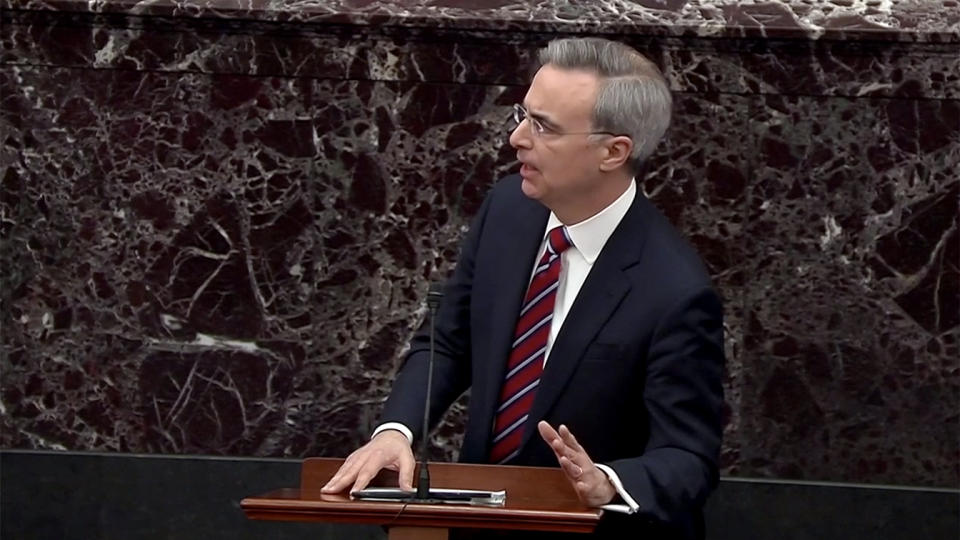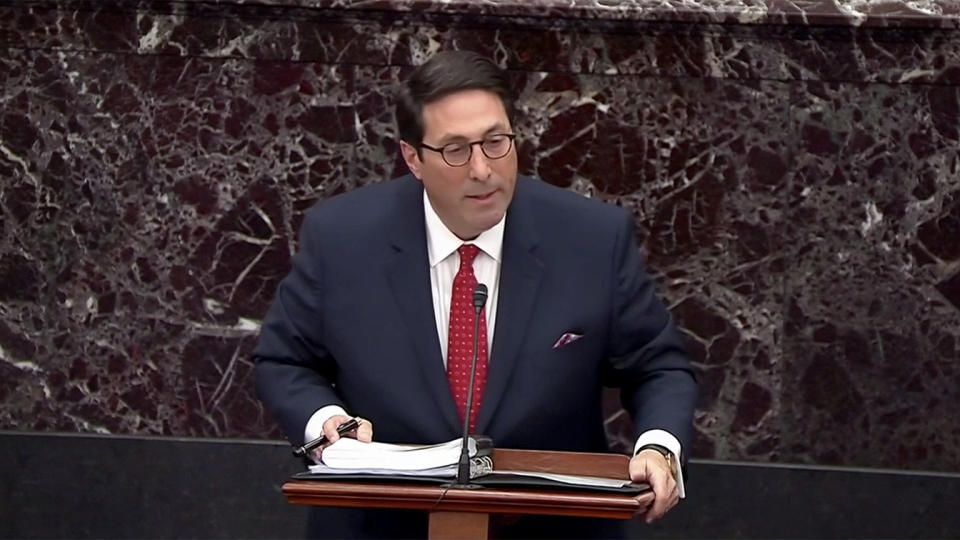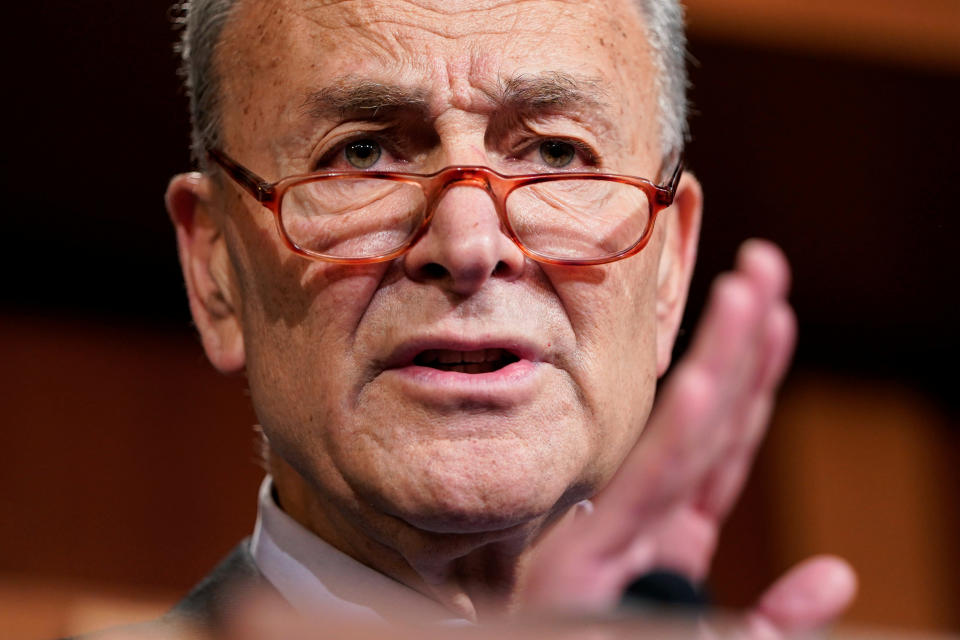As defense opens, Trump attorneys accuse Democrats of 'blind drive' to impeachment
WASHINGTON — Attorneys for President Trump opened their defense in his Senate impeachment trial Saturday morning by charging that the case presented by House Democrats was full of “bluster and innuendo,” and that “devastating evidence” would lead to the inevitable conclusion that the two articles of impeachment now being considered have no merit.
“The president did absolutely nothing wrong,” said White House counsel Pat Cipollone, who is leading Trump’s defense. That was a recurring theme of the session, which followed three days of presentations by House Democratic impeachment managers, and took up just two hours of the eight that Senate rules allowed. The trial will resume Monday at 1 p.m.
The other key point, made by Cipollone and others, was that Trump acted “in our national interest” by withholding $250 million in military aid from Ukraine for several months in the spring and summer of 2019.
In marked contrast to the sometimes impassioned rhetoric of the lead impeachment manager, Rep. Adam Schiff, D-Calif., the defense presentation was notably low key, devoting considerable time to the seemingly tangential issue of how much European allies contributed to Ukraine’s defense and whether Trump was genuinely concerned about the relative dearth of those contributions.
The Democratic case is that Trump withheld aid to Ukraine to pressure new Ukrainian President Volodymr Zelensky to announce (though not actually conduct) two investigations meant to help his personal political situation: one into purported Ukrainian efforts to help Hillary Clinton in the 2016 election, and another into former Vice President Joe Biden’s son Hunter, who was a member of the board of directors of Burisma, a Ukrainian energy company.
The previous evening, members of the president’s legal team told reporters on a conference call that the Biden name would come up frequently in their arguments. But that presumably will be put off until subsequent sessions; the session on Saturday, a time Trump has disparaged as “Death Valley” for television ratings, was devoted to attacks on the Democratic case by Cipollone, Jay Sekulow and other attorneys. Cipollone said that that weakness was a result of Democrats’ “blind drive to impeach the president.”

A recurring theme of the lawyers’ presentation was that evidence had been “hidden” or “withheld” by the Democrats. Some of the evidence Republicans said the Senate hadn’t seen included documents or testimony the House had sought in its inquiry, but was withheld by the White House.
Sekulow opened his own remarks by holding up a printed copy of special counsel Robert Mueller’s 400-page report into Russian electoral interference.
“This cost $32 million,” he said, a frequent Republican talking point in service of the argument that Democrats had sought to remove Trump from office over his dealings with Russia, and failing that were now attempting to do the very same over Ukraine. Sekulow then proceeded to delve deeper into the 2016 election, including a discussion of the FBI investigation into the Trump campaign, known as Operation Crossfire Hurricane.
At this point, Sen. Ben Sasse, R-Neb., could be seen suppressing a yawn, then, moments later, attempting to do so again.
And just as Democrats have argued that Trump was trying to help his own reelection prospects by having Zelensky announce an investigation that could damage Joe Biden, so did Cipollone argue that the president’s opponents were attempting to “overcome the results of the last election” and hoping to influence the next one, seeking to “tear up all of the ballots across this country.”
Near the end of his remarks, Cipollone went so far as to charge that Democrats were “here to partake in the most massive interference in an election in American history.” The intelligence community uniformly believed that ignominious distinction in fact belongs to the Kremlin, which dispatched an online army — both human and robot — to harm Hillary Clinton’s prospects in 2016. Cipollone insisted Trump was the real victim.
To defend Trump, he seemed to say, was to defend American democracy itself.
The members of the Senate could not have been especially happy to be forced into work on a Saturday morning, a fact the president’s attorneys plainly recognized. They promised that the day — and, in fact, their entire case — would move along “efficiently and quickly,” as opposed to what they described as a tedious and repetitive Democratic argument, which, they frequently mentioned, lasted for 23 of the 24 hours they were allotted.

Impeachment trial rules have left the senators without recourse to smartphones, or even coffee, and there was therefore little to do but listen. Sen. Susan Collins, R-Maine, who could be one of the centrists to decide Trump’s fate, took notes. Next to her, fellow moderate Sen. Lisa Murkowski, R-Alaska, sat still and looked gravely at whoever was speaking. Murkowski’s posture was perfect, while Sen. Ted Cruz, R-Texas, slumped in his chair. Sen. Jim Risch, R-Idaho, criticized for falling asleep on an earlier day of the trial, reclined as much as he could in his heavy wooden chair.
In the front row, Senate Majority Leader Mitch McConnell sat with his chair pushed back. His binder was unopened, his water glass untouched. In the very back of the chamber, Sen. Sherrod Brown, D-Ohio, sat with a wry, skeptical smile on his face.
Cipollone and other attorneys on Trump’s defense team argued that the president withheld the congressionally appropriated funds from Ukraine because he was irritated at the lack of “burden-sharing” on the part of Western European allies. Even more than the United States, those allies will benefit from bolstering nations like Ukraine that sit on the border with an increasingly bellicose Russia. Burden-sharing was a recurring theme for Cipollone and his team; as supporting evidence, they referenced the July 25 phone call between Zelensky and Trump that forms the basis of the impeachment inquiry.
“Germany does almost nothing for you,” Trump complained to Zelensky during that conversation, adding that “a lot of the European countries are the same way.”
In addition, the defense implied that Trump is generally hostile to foreign aid, whether that aid is intended for Ukraine, Pakistan or El Salvador. A list of foreign aid packages Trump has halted or canceled seemed to bolster that Trump was acting not to extort Zelensky, but out of a broader isolationist impulse. (It went unmentioned that Trump tried to stop the aid to Ukraine after it had been appropriated, and that he did so by directing the White House budget office to issue a series of nine “footnotes” throughout the summer of 2019. A recent report by the nonpartisan Government Accountability Office determined that Trump had no authority to keep the funds from being released.)
Trump’s attorneys also argued that the Ukrainians did not know that the funds were being held up until Politico reported on the hold in the last days of August. However, as Yahoo News previously reported, the Department of Defense had pushed all summer for the release of the funds, and that by August both legislators and military contractors had grown irritated by the delay as well. Other outlets have reported that the Ukrainians knew about the hold well before the news was made public.
Trump’s team also tried to show that the president was genuinely concerned with corruption, which is endemic to many post-Soviet nations. Zelensky came into office as a good-government reformer but, as Sekulow argued, an untested president could not be expected to clean the Augean stables in a matter of two or three months. “We’re acting as if there was a magic wand.”

Corruption was a real concern in Ukraine, which was why Congress required that the Pentagon certify that the aid would not be misused or stolen. The Defense Department did so in May.
The facts also undercut another assertion made by Trump’s lawyers: that he could not have possibly engaged in extortion of Zelensky because Trump told Gordon Sondland, U.S. ambassador to the European Union, that he wanted “no quid pro quo” and urged that Zelensky “do the right thing,” according to Sondland’s testimony to the impeachment inquiry in November. But that conversation between Sondland and Trump took place after a whistleblower complaint about his July 25 call had already been made. House Democratic managers have argued that Trump’s statements to Sondland were intended as a retroactive cover-up for the Zelensky pressure campaign.
The president’s attorneys also pointed out that the aid to Ukraine was, in fact, released. They didn’t mention that this took place on Sept. 11, two days after the inspector general of intelligence community notified Congress of the complaint in a letter.
Unwilling to merely play a spectator’s passive role, the Democrats had their own agenda on Saturday, beginning the day by delivering 28,578 pages — packed neatly into boxes — that were the full record of their impeachment inquiry. And after the defense finished its remarks, the impeachment managers held a press conference of their own.
In rebutting the president’s case, Schiff noted that the White House meeting sought by Zelensky — and which, like the military aid, was conditioned on his announcing investigations — had still not taken place. “The president is more than willing to meet with Putin at any time, but not with our ally, apparently,” Schiff said. Suggestions that he is somehow beholden to Russian leader Vladimir Putin for his 2016 electoral victory are known to enrage Trump.
Another impeachment manager, Rep. Jerry Nadler, D-N.Y., who chairs the House Judiciary Committee, addressed a lengthy argument by deputy White House counsel Patrick Philbin regarding witness subpoenas issued by the Democrats. Philbin charged that those subpoenas had not been legitimate because they had not been properly voted upon by the House.
“That’s simply wrong,” Nadler said, “and out of the power of the president to defy the House because he thinks the House didn’t follow its own procedures. The House can make its own procedures and follow it to its heart’s content, or not. It’s none of his business, frankly.”
By the time that Nadler had rendered his fiery verdict, many senators had departed Capitol Hill.

Sen. Elizabeth Warren, D-Mass., who is running for president, briskly hurried out of the chamber, presumably on her way to campaign in Iowa. While others did stop to entertain the press, she walked too fast for most reporters to catch up with her.
“I thought they did a good job,” said Sen. John Hoeven, R-N.D., who slipped out of the building alone. That appears to be the widespread sentiment among Republicans.
Speaking to a small scrum of reporters, Sen. Brown of Ohio speculated that “the desire of Mitch McConnell is to get this trial as quick as possible, to get it done as quickly as possible, and with absolute least attention from the American public. That’s how he operates: He operates in secret and Republicans blindly follow him.”
He added that McConnell was “a lapdog of the president.”
Brown was then confronted by a reporter for the conservative Washington Examiner, who began to argue with Brown about the impeachment inquiry, which she appeared to suggest had been unfair to President Trump. Brown began to argue back, only to be pushed toward the doors by his wife, the journalist and Twitter personality Connie Schultz. They had a flight to catch, she explained. And, in any case, there will be plenty of time for argument next week.
_____
Read more from Yahoo News:
The inside story of how the U.S. gave up a chance to kill Soleimani in 2007
Yahoo News/YouGov poll shows two-thirds of voters want the Senate to call new impeachment witnesses
Steyer: U.S. reparations for slavery will help 'repair the damage'
As Trump impeachment trial nears, the battle turns to witnesses




